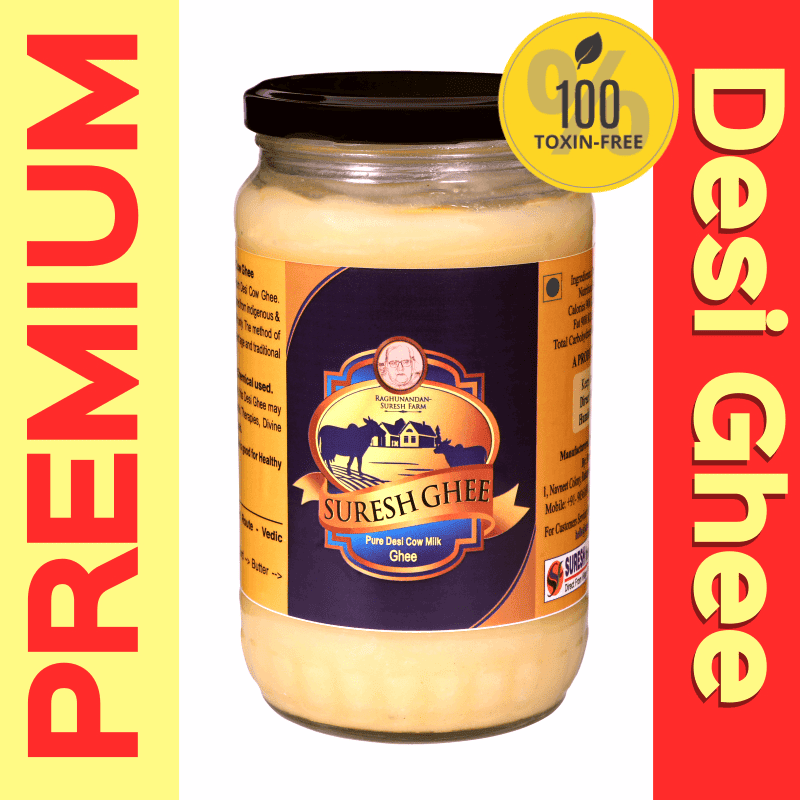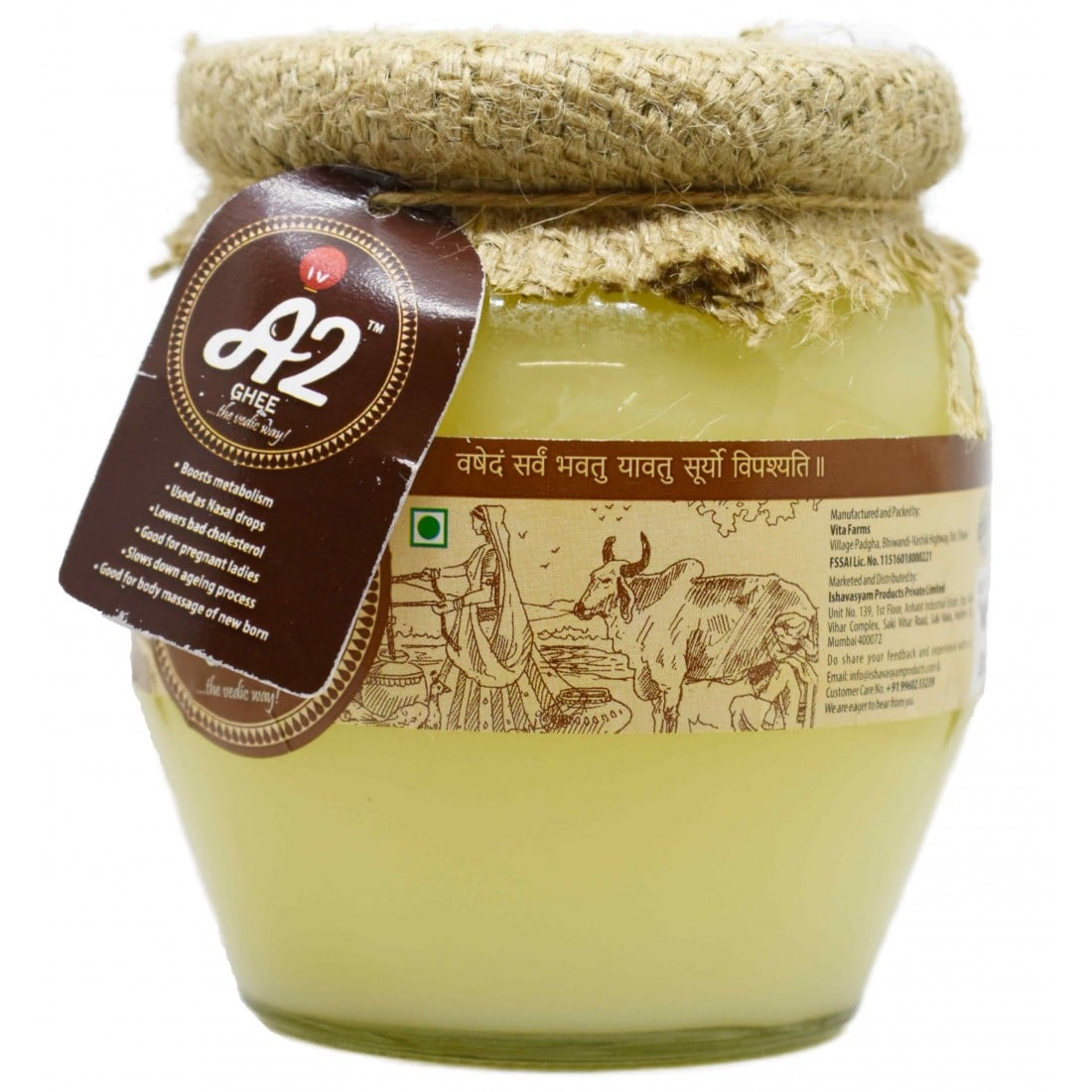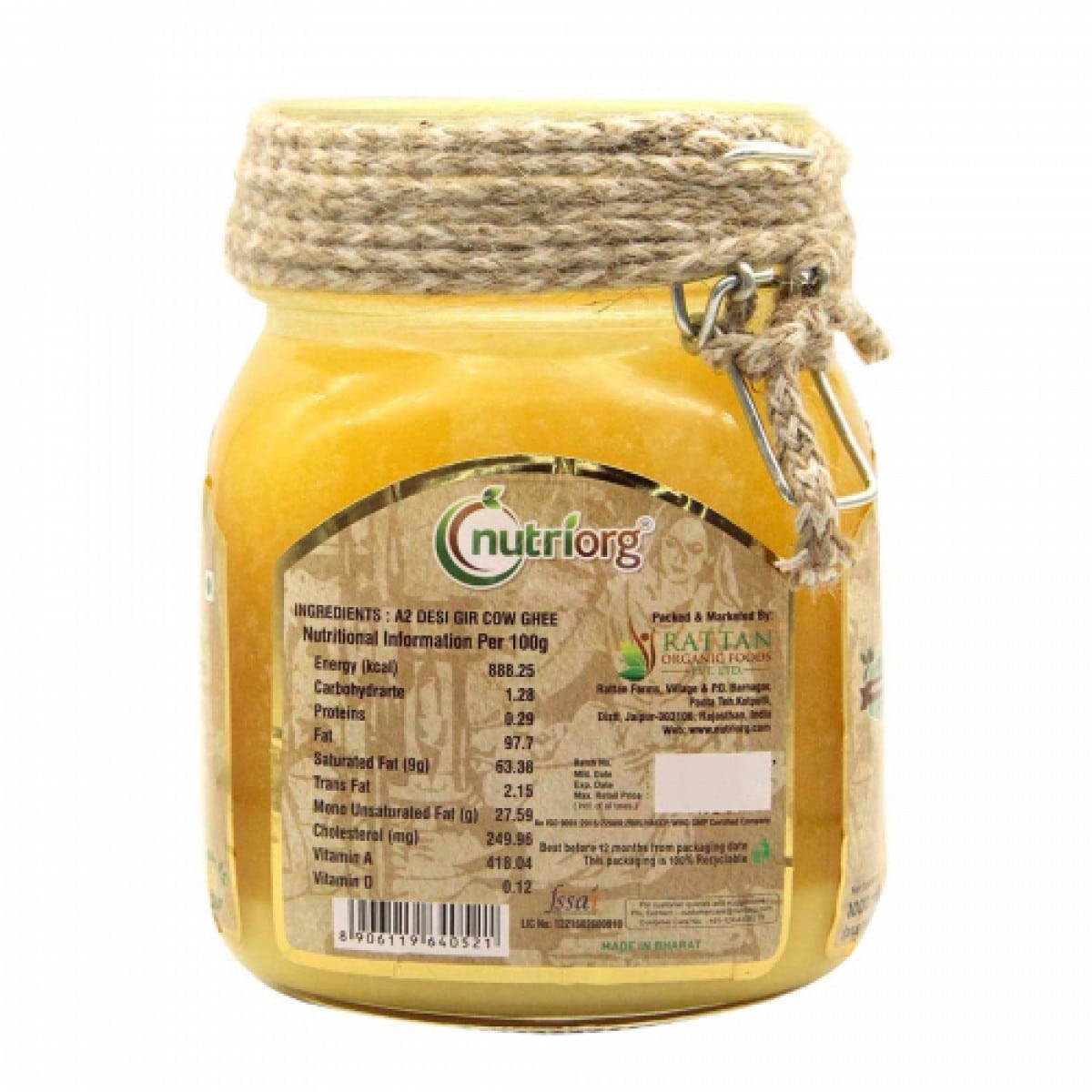At What Temperature Does The Cholesterol In Ghee Become Oxidized
Ghee has a high smoking point, which is 485 degrees Fahrenheit. If the cooking temperature crosses this smoking point, then the stability of ghee gets compromised. This is the time when ghee oil breaks down and the total ghee cholesterol content in ghee cooked food get oxidized. If your cooking temperature remains below the smoking point of ghee, there is no risk of oxidation of cholesterol.
Why Is Ghee Significant In Ayurveda
Ghee or ghrita is considered to be one of the mahasnehas. That means, its one of the four main types of oily substances described in Ayurveda.
Among the fatty substances or lubricants, ghrita is believed to be the best because of its efficiency in assimilating the properties of the ingredients added to it without compromising its own basic properties.1
In Ayurveda, the four main lubricants are ghrita , taila , vasa , and majja as mentioned in Ayurvedic classics. Goghrita and tila taila are said to be best among all and sthavara sneha respectively.
Can People With High Cholesterol Include Ghee In Daily Diet
High cholesterol is not an uncommon problem in India. A recent study revealed that high cholesterol is found in 25-30% of the urban population and 15-20% of the rural population in India1 and this can be attributed to genetic risk, lack of physical activity and unhealthy dietary habits. High cholesterol is not a serious health hazard if proper treatments and remedies are put into action however, if left unattended, it can even lead to fatality. As per a recent study, every 40-point increase in total cholesterol doubles the probability of young people dying from heart disease.2
There are two types of cholesterols, low-density lipoproteins also called bad cholesterol and high-density lipoproteins , also called good cholesterol. It is often the bad cholesterol that increases the risk of health problems since it tends to accumulate in the arteries. Therefore, it is important to maintain an appropriate balance between LDL and HDL for healthy cholesterol levels. It is reported that the cholesterol levels tend to rise as you get older however, a majority of the victims of heart attacks are youngsters.3
Ghee has always been a staple in Indian cuisine and it makes food much more tasty and desirable. A majority of Indian delicacies have some amount of ghee in them, and if you have a sweet tooth, then you have experienced that most Indian sweets are made from pure ghee. Therefore, the question that arises is how safe is ghee, especially when you have high cholesterol levels?
Recommended Reading: What To Eat To Improve Good Cholesterol
What Does Ayurveda Say About Consuming Ghee
In Ayurveda, anything we swallow is medicine when consumed with awareness, but it can act as a poison when done incorrectly. This is especially true of Ghee. The normal recommended dosage of Ghee to support health is approx 15 grams, depending on your dosha, family history, and genetics. Ghee made from organic dairy sources should be preferred over Ghee made from vegetable oils, which may contain higher trans-fatty acids.
What Do The Doctors Say On Consumption Of Ghee For Cholesterol

Undoubtedly, doctors are still cautious about consuming Ghee and suggest their patients to avoid it to have a healthy body. They are true at their part because they have a reason to claim so. So, why do todays doctors still have reservations on Ghee?
There are various reasons:
- Usage of passive modes of transportation
- Modern society technologies and comforts
Understanding all the above, doctors believe that, After an intake, outtake is also necessary, which many of us do not believe. Because usually people consume Ghee but forget to live a healthy lifestyle by putting exercise in their daily routine. Now, Lets take a few minutes & know about saturated fats.
Don’t Miss: Does Eating Cheese Raise Cholesterol
Does Ghee Has Hdl
HDL is a good cholesterol. It is beneficial to body because it whisks cholesterol away from the arterial walls and off the liver, protecting against the plaque building up, which is a common trigger of heart attack.
So, higher levels of HDL, goes hand in hand with lower level of triglycerides and you can maintain a healthy heart with the ghee diet support.
Ghee Vs Butter: Which Fat Reigns Supreme
While some tout ghee as butters healthier cousin, ONeill says that ghees perceived benefits may be overblown. There is no significant difference between the two. The fat and vitamin content is almost the same.
ONeill clarifies three common health claims about ghee butter.
Q. Is ghee dairy free?
A. Its not dairy-free, though ghee may be a good choice for people who are lactose-intolerant. Thats because it contains extremely low levels of lactose and casein . But so does butter.
Some people who avoid dairy for digestive reasons may tolerate ghee better than butter. But in general, they should be fine with butter as well because the amounts of lactose and casein are so small, notes ONeill. If you have a casein allergy, you should definitely avoid consuming both in case of cross-contamination.
Q. Is ghee better for digestion and colon health?
A. Dairy products contain a compound called butyrate, which is a type of short-chain fatty acid. Butyrate is the main energy source for the cells that line your colon and helps them regenerate. This process is important for colon health and digestion.
Some herald ghee as a rich source of butyrate, but ONeill says not so fast. Ghee has about 1% of butyrate, which is a tiny, insignificant amount compared to what your colon produces, she says.
Q. Is ghee good for weight loss?
A. Its not hard to find a blog claiming ghee is a metabolism-booster. But what does science say?
You May Like: How To Check My Cholesterol
We All Should Take Ghee Cholesterol Count Into Active Consideration So That We Can Stay Safe And Healthy
If you are looking for good quality ghee to ensure healthy control over the harmful LDL cholesterol levels in your body, you should select organic grass-fed cow ghee of assured quality and relevant product certification.
You may bring home Milkio organic grass-fed ghee. Manufactured in New Zealand, this USDA-certified 100% pure cow ghee is lactose and casein-free. You can trust this storage-friendly cooking oil that it is versatile and you can use Milkio ghee in all types of cooking including high-temperature cooking like baking, sautéing, deep-frying, etc.
You can add ghee to all cooked dishes as a taste enhancer due to its unique nutty flavor. Also, you can use Milkio ghee as a healthy dairy butter substitute.
Milkio Grass-fed ghee is a certified organic and Non-GMO dairy product, and it is endorsed by BioGro, New Zealand. Milkio ghee is Halal and Kosher certified, and now available for both online and offline purchase. If you want to know about Milkio organic grass fed and its availability, please browse Milkio NZ .
Ref links:
Cow Ghee Weight Management
Whether its about gaining or losing weight, cow ghee can help in both. For losing weight, it’s a good way to obtain Conjugated Linoleic Acid which increases the metabolic rate thus supporting weight reduction strategy and reducing stomach fat. It can help in bringing down the insulin resistance, keep a check on weight and help individuals in preventing diabetes. It does not have any hydrogenated natural oils and thus do not allow extra and unneeded fat to deposit.
Recommended Reading: What Is Reverse Cholesterol Transport
Cow Ghee And Cholesterol Control
Moderate Consumption of pure brown butter and cholesterol control is an interrelated factor. You can keep your LDL cholesterol numbers chart strictly under control by adding moderate ghee to your diet.
According to dietitians, every day 3 teaspoons of pure cow ghee is harmless and can keep your cholesterol count controlled if coupled with a healthy diet and active lifestyle, and may help in keeping ghee cholesterol problem away.
Is Dalda Good For Health Dalda Saturated Or Unsaturated Fat
Dalda reigned over the Indian markets for about forty years courtesy to lower prices and exact same taste as pure cow ghee, but is Dalda good for health?
Dalda is synonymous with hydrogenated vegetable oils in the South-Asian region. Here, we are gonna focus on everything related to it and more.
Pure cow milk ghee and refined cooking oils have always belonged to the top tier of the price distribution. They are expensive and generally out of reach for the people of lower economic background.
In the 1930s, hydrogenated vegetable oils were imported by the Hindustan Vanaspati Manufacture Co. Later, they started manufacture in the country itself and named it DALDA.
Recommended Reading: What Are Some High Cholesterol Foods
Origin And Cultivation Of Cow Ghee
The origin of ghee is listed in Indian Vedas and epics, that link the ghee-making to the 3rd century BC. Ghee is the most commonly used dairy product in India.
The production of Ghee is not just confined to the Indian subcontinent only. Several other countries also make ghee. For example, people living in Egypt make a product identical to ghee which is known by the term Samna Baladi, which means countryside ghee”.
The process of making Samna Baladi is similar to that of ghee in terms of method and outcome, however, they commonly make it from buffalo milk instead of cow milk. Ghee is also exported to various other parts of the world which includes some African and Asian countries, Australia, Armenia, United Kingdom, Belgium, Netherlands, United States and New Zealand.
Ghee And Hdl Cholesterol

Ghee cholesterol conjunction is harmful to heart health but there is a catch. LDL cholesterol count in blood is riskier to heart health whereas HDL cholesterol in the blood doesnt impact heart health that negatively.
Moreover, HDL is beneficial to the body because it is able to whisk cholesterol away from arterial walls and off the liver, protecting against plaque buildup, which is a common trigger of heart attack.
You may consider the inclusion of the ghee in diet for making a pure ghee diet in moderation. Ghee diet should be coupled with exercise, and this lifestyle change can increase the level of HDL, the good cholesterol, in your blood. Higher levels of HDL will go hand in hand with lower levels of triglycerides and you can maintain a healthy heart with the ghee diet support.
Read Also: What Is Good Cholesterol Level Australia
Caution For Heart Patients
Ghees cholesterol may oxidise during the high-heat processing method. The presence of oxidised cholesterol can cause an increased risk of a variety of ailments, including heart disease. However, it is not recommended for heart patients since it may raise the risk of a heart attack. Also, this is due to fatty acids, which increase blood pressure and render people more vulnerable to heart attacks.
Desi Cow Ghee Lower Cholesterol
Cow Ghee is quite a wondrous fat, that actually improves the ratio of HDL to LDL in your body. When you consume desi cow ghee, in moderation, of course, you increase your bodys ability to get rid of the bad cholesterol. Its no surprise that desi cow ghee is considered as the healthiest fat for consumption even in Ayurveda. Ayurvedic experts always recommend desi cow ghee as it is said to increase the Agni and nourish the Ojas . Ghee also lubricates the connectives tissues in the body, which strengthen all organs especially the nervous system. Which is why ghee is also used as a part of Ayurvedic medicine. It ensures proper absorption of medicinal herbs by the body. The effects are any day better for your body than popping an allopathic tablet which may or may not get fully absorbed by your body.
Have you ever noticed that foods cooked in pure desi ghee feel much lighter on the palate? Theres a pretty good reason for that too. Desi ghee is much easier for your body to digest when compared to other cooking oils. Now the question is Where can I buy Desi Cow Ghee? Buy ghee online at our online store. Visit our website to know more.
Typical fats tend to add an additional load on to your digestive system as they have to be broken down before being digested. With ghee, its different. Desi ghee can actually stimulate the secretion of acids in your stomach to help with digestion.
Benefits of Ghee for Cholesterol
Better Than Cooking Oil
Read Also: Can High Cholesterol Cause A Rash
Our Ancestors And Their Consumption Of Ghee
Our ancestors used to eat a healthy amount of Ghee and lived long & healthy lives because they were more physically active than we are as they had to hunt and gather their food before the development of agriculture. Their bones were also significantly stronger.
The ladies of the household used to work hard, like getting water from nearby walls, doing all the chores on their own, and the mens used to go to farms, do heavy workloads, etc. So it seems pretty obvious that people who ate real food rich in saturated fat lived healthy lives.
Why Do People Avoid Ghee
Nowadays, many people avoid consuming Ghee because they believe it isnt healthful. According to them, Ghee causes heart disease. And more importantly, they believe that Ghee makes them fat! The main reason for these recommendations is that Ghee is high in saturated fat, which is thought to be unhealthy. But what if we say saturated fat isnt harmful but, in fact, healthful?
Do you know, there was the time when our ancestors believed that their meal was incomplete without a spoonful of Ghee. Here, in the article, we will focus and elaborate on how our ancestors were right. Also, we will explain why including pure cow ghee in your daily diet is good for cholesterol and is a boon to your overall health.
Don’t Miss: What Vitamins Will Help Lower Cholesterol
What Is Ghee And How Is It Made
Ghee has been used for thousands of years in Ayurveda, an Indian medical system with a natural and holistic approach to both physical and mental health stemming from ancient writings. In the Ayurveda practice, ghee is considered sacred and is used in many religious ceremonies, as well as in cooking. Despite its ancient history, ghee has recently resurfaced in the U.S. and beyond.
To make ghee, regular butter usually from cows milk is melted so the water evaporates, and the butter is separated into liquid fats and milk solids. The milk solids are browned and then removed. Whats left is complete milk fat, which usually has less lactose, a sugar found in milk, than regular butter. The golden liquid is able to withstand a higher smoke point usually 485 degrees Fahrenheit compared to butter, which begins to smoke at 350 degrees Fahrenheit.
Can People Who Suffer From Ldl Cholesterol Eat Cow Ghee
There is no direct reaction between cow ghee cholesterol, LDL type. Cows milk is used for making organic cow ghee. If a consumer practices overeating ghee and a sedentary lifestyle, there is a high chance that his blood will get high blood cholesterol.
According to good cholesterol and bad cholesterol study, if you maintain a moderate ghee diet and an active lifestyle, you have little risk of developing high LDL, but by maintaining the opposite, which means a ghee diet and a sedentary lifestyle, you can harm your health pretty well. A cholesterol test will show probably low good cholesterol and LDL cholesterol high.
Read Also: How Does Cholesterol Build Up
Busting Myths On Consumption Of Ghee For Cholesterol Levels
Lets be honest with todays facts about Ghee and its effects on our health, including raising cholesterol levels. Of course, weve all been doubtful of what our ancestors considered, especially regarding fitness and nutrition. But, surprisingly, science has now backed up what our ancestors preached and practiced when it comes to health and general well-being. And the same goes for Ghee A Nutritional Product.
Ghee And Cholesterol Relationship: How Ghee Is Good For Health

It is true that high fat-based foods are proven for their anti-health impact on the heart, and they are assumed to act as a cholesterol trigger. But then, how come ghee butter is health-friendly and how clarified butter helps in controlling cholesterol?
- Hereby when mentioning ghee, were indicating at pure cow ghee, procured from 100% grass fed cow milk. Yes, when you plan to consume pure cow ghee in moderation along with diet restrictions, you will enjoy the digestive benefits of ghee.
- According to a recent study, on the people of India, it has been observed that healthy fat and cholesterol level in blood is healthier in people who consume more cow clarified butter and less mustard oil.
- Ghee Cholesterol quantity ranges from 252 to 284 mg per 100 grams out of which HDL cholesterol is the major component.
- You should not consider ghee cholesterol relation as completely negative, if you can practice consuming it in moderation.
Also Read:- 25+ Effective Health Benefits of Consuming Ghee
Recommended Reading: Does Corn Oil Have Cholesterol
If Ghee Cholesterol And Heart Disease Are Related To Each Other Then What Makes Clarified Butter Healthy
Yes, its healthy if you plan to consume pure brown butter under moderation and proper diet planning. According to Ayurveda, a healthy person consuming clarified butter may reduce cholesterol or not highly depends on the lifestyle and the number of physical activities he does. However, consumption of unsalted butter-ghee has to be restricted as well.
People with a sedentary lifestyle or obesity are at higher risk of developing harmful LDL cholesterol level 6 range: furthermore, if you include more fats and oil-based foods in your food, you will have the tendency to develop higher cholesterol.